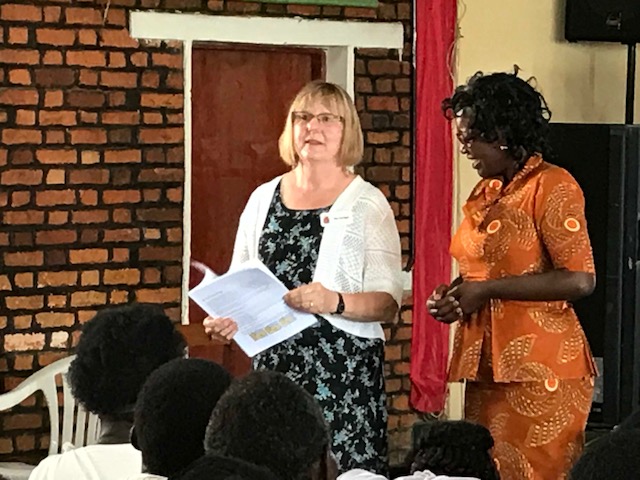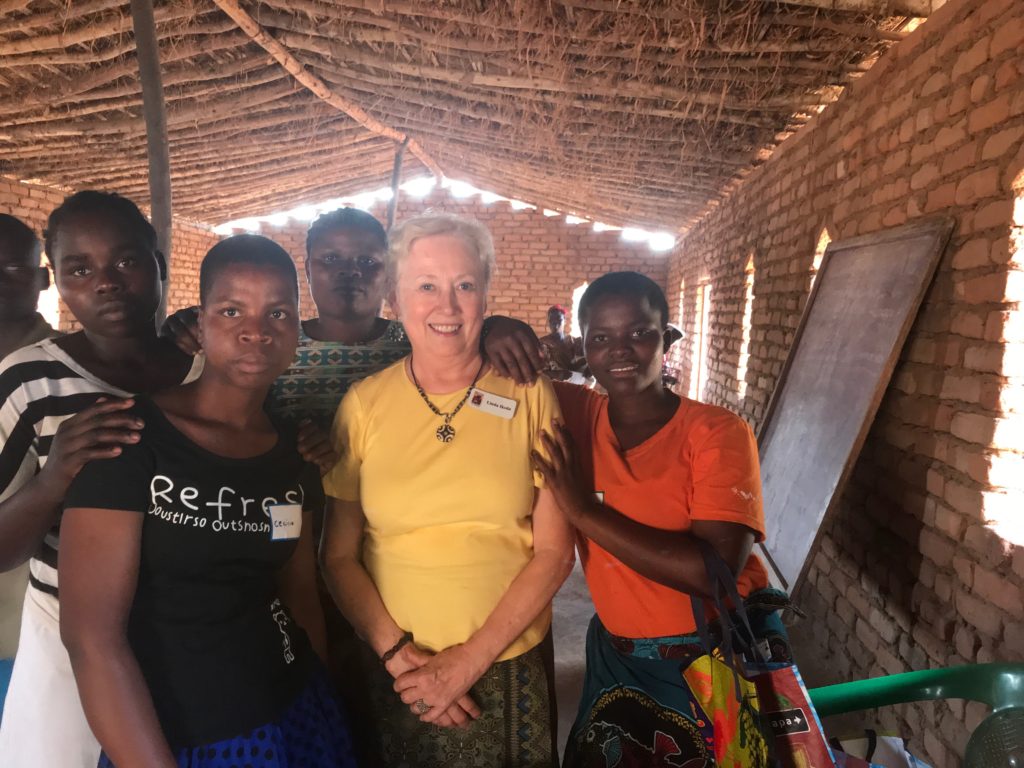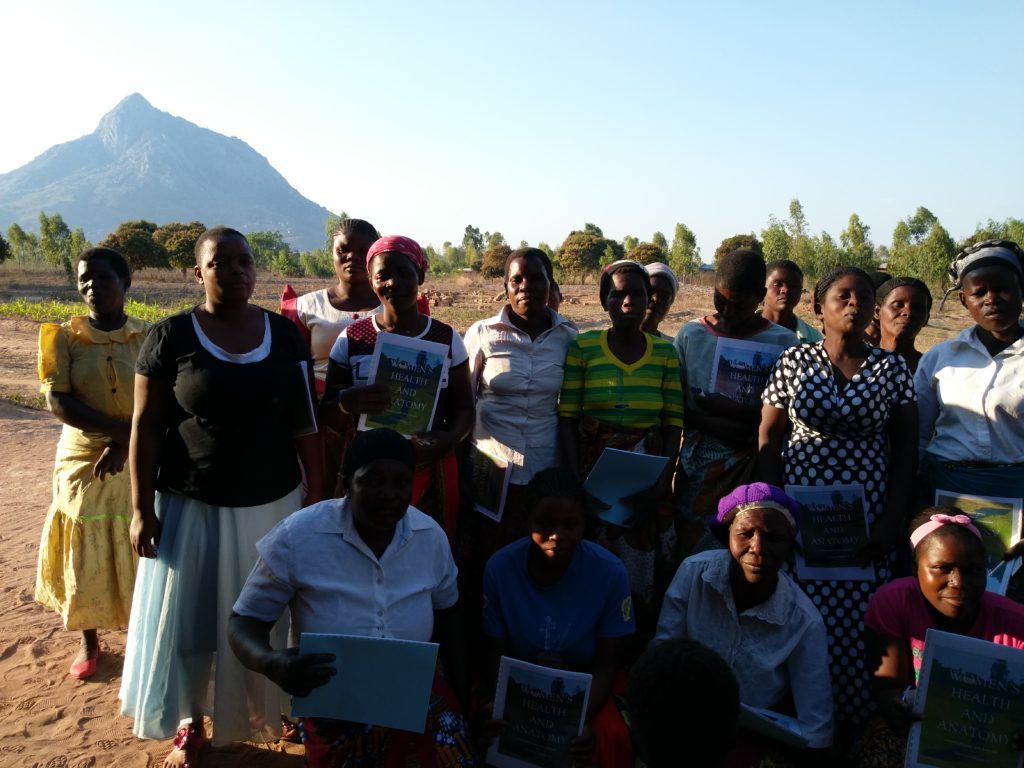A simple booklet explaining basic sexual education elicited cheers and applause from women in Malawi and Rwanda, and brought them, for the first time in their lives, empowering information about their own bodies and biology.
Registered nurse and Empower minister Sue Kerrigan uses the booklet to teach a Women’s Health Seminar that educates women about their own anatomy and physiology. She taught the class this summer in Byumba, Rwanda, and in Phalombe, Malawi. Topics such as sex, sexually transmitted diseases, conception, pregnancy, childbirth and breast-feeding are included. For many of the women in this Empower workshop, this is the first time they’ve ever learned about how “fearfully and wonderfully made” they are.
On a trip about four years ago, Sue Kerrigan went to Mulange, Malawi to help teach the Created to Belong and Healing from Trauma classes with Linda Ikeda. It became obvious that many of the women did not have any information about basic health, hygiene, or information about sex. Since Sue was a nurse, why not have her sit down with some of the women to allow them to ask questions?

So Sue gathered with the women during lunch, and the informal discussion brought out many questions. “Most of the questions were about sex,” she said. Many were based on misinformation they’d received. For example, they asked “if you use a condom more than once, could that cause problems?” The women told Sue that men did not want to use condoms, and so they often told women that using them could cause cancer and other problems.
The enthusiastic response to this information made Sue decide to look for more resources to educate the women. She found a book with illustrations of female anatomy. In the small villages where Linda and Sue teach, schools do not teach sex education, and most women don’t know much about what is inside their bodies and how they function.
The next year in Mulange, she created a 30-page booklet with illustrations and information on STDs, childbirth, birth control, anatomy, and more. She made the mistake of handing out the book before her lecture, and the women quickly began talking, giggling, and looking at the pictures instead of listening to her teach. She learned the following year to teach first, then hand out the books and answer questions.
“We had the session at lunch, and they started out in nice neat rows, but by the end of the 45 minutes, they were gathered around me, looking at the book, and were very engaged.”
Even though many of these women are mothers, they are not clear on the specifics of pregnancy, childbirth and female anatomy. They are fascinated by the pictures in the booklet, of course, and full of questions. They asked Sue to show them on the diagram where the baby actually comes out of a woman’s body, because even though they have given birth, they didn’t really know. When shown how a baby comes through the birth canal, they literally cheered and applauded.
“Most have never had a basic biology course,” Sue said. “It’s all new to them.”
This year, she has brought the class to women in Byumba, Rwanda, and in Phalombe, Malawi.
When women in these small villages give birth, they mostly do so at home, Sue said. Although there are midwives, the women told Sue they usually just call their mother. They give birth not squatting or in bed but lying on the ground, she said. Linda adds that this is not on carpet or even a wooden floor but rather on the dirt.

The seminar also included a discussion of breastfeeding. Sue asked the women what happened when a mother couldn’t nurse her own baby, since formula is not readily available. She told them about the practice in the U.S. of mothers donating milk for other babies. The women were shocked and said they had never heard of a baby drinking another mother’s milk. Instead, babies who won’t nurse properly are fed watered down rice cereal or porridge.
The women were curious and not shy, and enjoyed a bit of bawdy joking. “One older woman in her late 70s asked if my husband had come on the trip with me,” Sue said. “When I told her no, she offered to loan me her husband. The rest of the women thought that was very funny.”
In trying to teach the rhythm method of birth control, Sue urged the women to track their cycle and during the week they’d be most likely to get pregnant, to tell their husbands “no thank you” to sex. The women laughed at that suggestion.
“I got the impression that it was not really an option for them to say no,” she said. “It’s not so much consent as demand and comply.”
Still, Sue said, just having this discussion introduces the idea that is possible to say no, or for women to voice their opinion. It dovetails well with the New Woman, New Man, New Life seminar that teaches biblical equality. Telling the women that they can ask for more foreplay to make sex more enjoyable, or express their preferences in the marriage bed, will ultimately strengthen marriages, she noted.
Further, a basic understanding of sexually transmitted diseases might encourage women to seek medical attention if they notice symptoms.
Linda Ikeda, who wrote and teaches both our Created to Belong and Healing from Trauma seminars, notes that in Created to Belong, she has a quote from one of her professors, Dr. Victoria Dickerson: “information of a difference leads to change.” This quote plays out dramatically in the Women’s Health Seminar because often, the women simply have not received any information at all.

“When you give women information about their own bodies, which they have typically not had much dominion over, it leads to change,” Linda says. “Seeing their faces light up when they discovered where different parts were and understanding how conception takes place was awesome.”

The New Man, New Woman, New Life seminar teaches biblical equality. One key concept is that a woman is an equal partner, Ezer Kenegdo, which is quite different from the cultural norms. Prior to learning about equality, African women had little choice about when to have sex.
“Understanding ovulation and fertility cycles gives them information that could help them to choose when to engage in sex if they are trying to get pregnant, or when not to, if they are trying to prevent it,” Linda said. “Not that African women have that much to say about when sex occurs in their marriage, which is how this knowledge is supported by NMNWNL, as they understand their Ezer Kenegdo-ness!”
The women also suggested that Empower do a men’s seminar, to introduce some of these same ideas to men.
The Women’s Health Seminar is taught during the same week as Created to Belong and Healing from Trauma, which both educate about the impact of past trauma. “I think understanding the basics of their sexuality helps them to make more sense of why sexual trauma is so devastating,” Linda adds.
The booklet that Sue created costs less than $5 per copy to create and print. Our goal is to invite 150 women to the class next year. If you’d like to help bring this life-changing educational material to women, even a small donation will make a difference.
Translating the book into Chichewa, the local language, would allow most of the women to read and share information (the local literacy rate is about 70 to 80 percent). Translation could cost around $300, but finding someone to do it might be difficult, since most of the translation work is done by men, who might not feel comfortable with the subject matter of the booklet.
Please keep this seminar, which we continue to develop, in your prayers. If you’d like to make a donation to help offset the cost of the books or translation, click here.

My heart is always moved when I read what Women empower International is doing ; touching lives of the most disadvantaged in communities in Africa. May God continue to use and guide you and enable you to do grater exploits for His glory. Amen.
Your co-worker in the same vine yard in Uganda.